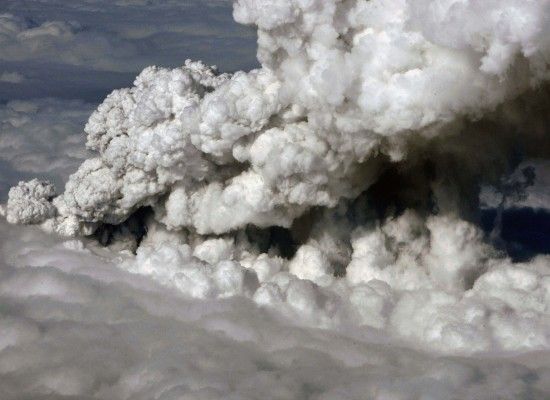
Today’s hot news is about a travel crisis after an eruption under a glacier in Eyjafjallajoekull Iceland, the second eruption in less than a month. "The ash . . . is expected to move south overnight. Up to 5,000 flights could be affected. The Republic of Ireland, Norway, Denmark, Sweden, Belgium, the Netherlands and Finland all later shut down their airspace entirely, while there is also major disruption in France, Germany, and Poland. Normal air traffic control services cannot be provided to flights in airspaces affected by volcanic ash, requiring the temporary suspension of air traffic. Experts warned that the tiny particles of rock, glass and sand contained in the ash cloud could be sufficient to jam aircraft engines. . . . The problem could persist for a further 48 hours and could last for a few days. The move silenced Heathrow airport, the world's second busiest and stranded tens of thousands of passengers around the world. “All I can do, like anyone else, is sit and wait."(1)
I ask myself, Is this a reminder of the angel’s words to the prophet Daniel But thou, O Daniel, shut up the words, and seal the book, even to the time of the end: many shall run to and fro, and knowledge shall be increased.(2)
Harry Ironside says, “Men seem to have a perfect mania for travelling from place to place; and human inventions of all kinds are pressed into service to accelerate and make comfortable those who run to and fro. Coupled with this we have the ever widening diffusion of the productions of the printing press, so that knowledge of all kinds is indeed increased.” [For “printing press” read “Internet”!]. On the other hand, E.J. Young says of the phrase “Many shall run to and fro”: “This phrase is extremely difficult to interpret. . . Calvin translates many shall investigate, and Jerome . . . refers the action to the study of the book itself. . . . However . . these views . . do not . . reflect the force of the Heb. verb [which] means “to go,” “to rove about”.” Young then quotes Job 1:7b and Amos 8:12 in support of the literal sense, saying, “The verb appears to describe a vain travelling about in order to discover knowledge . . . for the sake of increasing knowledge.”
Whether the reader sees in these words a specific fulfilment of prophecy just prior to the Lord Jesus’ return to earth, depends on whether he is living in daily expectation of such an imminent event. Gleason Archer’s comment on the verb in “many shall run” is: “[M]any of God’s people who pay heed to these prophetic sayings will eagerly seek to understand how they are presently being fulfilled or how they are going to be fulfilled in the future.” Thus, if we read Daniel 12:4 from the standpoint of Christ’s imminent return, we will not fail to miss the force of this verse. There’s never been so much travel, nor such an accumulation of knowledge. The KJV translators got it right [cp. NRS]. We can read it as it stands; it’s an entirely accurate prediction of current events and conditions.
Image acknowledgement: http://www.huffingtonpost.com/
(1) Quoted from bbc..co.uk on the day.
(2) Daniel 12:4.
(3) 1911/74 H.A. Ironside, Daniel the Prophet, NJ: Loizeaux, p. 223.
(4) 1949 Edward J. Young Prophecy of Daniel, MI:Eerdmans, p.258.
(5) 1985 Expositor's Bible Commentary, Vol. 7. MI: Regency, p. 154